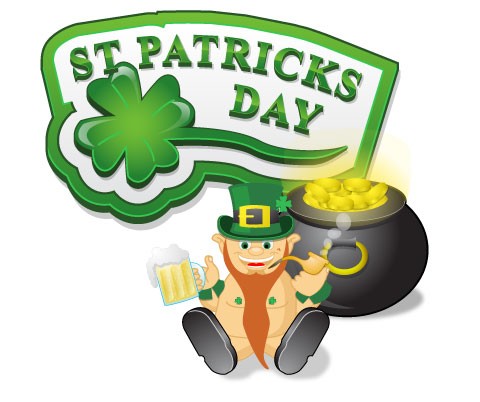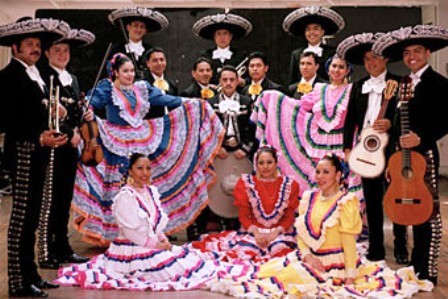Although our most popular holidays find their roots in religion, or the virtues of modesty, humility, family, and an appreciation of one another, we live in an age where these holidays have lost their once-special meaning and have become largely commercialized. While many holidays have simply been corrupted by big business, the impact hasn’t stopped there, and commercial interests have even gone on to manufacture holidays that are now simply referred to as “Hallmark Holidays”.
One thing to keep in mind is that not everyone observes the commercialized versions of these holidays, and there are still people who believe in their original intentions. In fact, in some circles there has even been a backlash against this ‘bastardization of tradition’. Following is a list of how the desire to make a buck has impacted our holidays.
1. Christmas

Christmas is supposed to be a time to celebrate and reflect on the birth of Christ. But that meaning is now all but lost. Instead, most people opt for the more commercialized meaning, and focus squarely on spending hundreds (thousands) of dollars buying useless presents and paying attention to “getting” rather than the spirit of giving. Far from a time of togetherness, humility, and modesty, Christmas is now seen as a economic stimulus for lagging economies, with many stores beginning the season and starting to sell “Christmas items” as early as October.
2. Halloween
The intent of this Irish created holiday was to recognize how the dead were a threat to the living with the burning of livestock. Not much of the original meaning remains, and in fact if you were to ask a random selection of people what Halloween is about, they are much more likely to tell you about trick-or-treating, dressing up in costumes, haunted houses and ghost rides, and of course the release of a few good horror flicks (released specifically to take advantage of the holiday). Stores can be seen capitalizing on the theme to sell companion lighting, ornaments (spiders, spray-web, etc.), novelty yard items like monsters and tombstones, and of course prepackaged selections of candies to be given to trick-or-treating children.
3. Valentine’s Day
When we think of Valentine’s Day, the imagery that races through our thoughts is the same. Heart-shaped candy, cards, flowers, presents, mushy music, and so on. We forget in the process, however, are the numerous Christian martyrs named Valentine, a couple of whom the name of the holiday is attributed. As you can imagine, the original story may not have been compelling enough to spawn a multi-million dollar industry. According to some estimates, almost one billion valentines are sent each year, 85 percent of them by women.
4. Thanksgiving
The true meaning of Thanksgiving is commemorating when the Pilgrims and Indians came together in thanks of the feast that was brought before them. Rather than observing the importance of giving thanks; businesses refer to this day as “Turkey Day”. The ever changing perception of this holiday (thanks to good marketing and in-your-face deals) however, not only do a majority of employees get the day off (as a paid holiday), but the holiday has become one of the busiest travel periods of the year and is often spent shopping for Black Friday deals, watching Football, or parades on tv (invariably full of corporate and other floats trying to sell you something), and cooking and eating.
5. St. Patrick’s Day

Green is the word for this particular holiday not only celebrated by the Irish but also others who just want to drink the green beer, wear the oversized Irish hats, and generally participate in the drunken revelry. The true meaning of this holiday is to remember the Irish saint; Saint Patrick. Of course most people don’t care about that, and instantly associate the day’s Irish origin to everything green. Stores, bars, and businesses go as far as selling anything green from “Kiss me I’m Irish” garters to green Shamrock shakes from McDonalds. Some cities go as far as coloring whole bodies of water green. Businesses are also selling green decoration lights for your house as well as St. Patrick stick ons. Hair salons and make up counters also do sales on this day from green hair to green finger nails; this day brings out the green in almost everyone.
While eating, drinking, and generally enjoying yourself with everything green sounds great, it has also caused people to forget the history of the holiday and instead focus on the more hedonistic aspects.
6. Fourth of July
This U.S holiday is of course the day America remembers the adoption of the Declaration of Independence. Rather than use this time for reflection, for most people this day is more about barbecues and picnics, decorations, fireworks, waterworks, and light shows. Independence Day deals are hard to miss at grocery stores and supermarkets, the same goes for concerts and other outdoor festivals, and blockbuster movie openings.
7. New Year’s Eve/Day
Happy New Year is the words everyone hears after the New York ball drops in a matter of seconds commemorating a brand new year. Most people forget what they’re supposed to be celebrating and opt instead for no holds barred drinking and partying, rather than opting for the more family-oriented affair.
8. Easter
Easter is supposed to be the most important feast in the Christian calendar. Rather than observing Easter’s true meaning; the Resurrection of Christ, however, this holiday is commercialized with Easter bunnies, plastic eggs, jelly beans, play grass, and candy to fill Easter baskets. Businesses not only allow you to build your own baskets from scratch, they now sell boys and girls already make baskets along with costumes and other play-gear. These baskets do not have to be candy filled they now offer healthier baskets or baskets filled with fun toys and activities. Restaurants also profit from breakfasts, brunches, lunches, or dinners that families plan together.
9. Kwanza
Kwanza is celebrated for seven days after Christmas. This holiday is celebrated by African Americans commemorating their family, community, and culture. As with most other holidays, this one hasn’t been left alone either. In spite of drawing criticism from some quarters, businesses still take advantage of this holiday to sell everything from food and party-equipment, to greeting cards, special candles (for the candle lighting ceremony), and so on.
10. Mother’s Day

Mother’s Day; this is the day to remember our mothers and mothers reflecting on their children who made them mothers in the first place. From young mothers to old, this holiday is celebrated on a Sunday in the month of May. How can you best celebrate this holiday? For most, it doesn’t mean actually spending some time with your mother, making her breakfast in bed, helping her out with chores, or something similar. Instead, stores sell mother’s day appreciation gifts, offer discounts on perfumes, handbags, or anything else your mother may potentially be interested in, and restaurants fill up quickly due to family reservations. Flower and card shops sales boom all around as people opt for cards instead of human interaction.
11. Father’s Day
The male counterpart to Mother’s Day, this holiday is of course the day to remember all the fathers. Even though fathers deserve honor and appreciation all year round (just like mothers) many only observe this day because it’s a holiday and they feel obligated. Rather than pay tribute to parenting, this holiday has become more about gift-giving (which, in the case of fathers, tend to be electronic equipment, tools, outdoor gear, and so on). According to business research publisher, IBISWorld, Americans will spend approximately $11 billion on gifts for their fathers in 2008.
12. Memorial Day
Memorial Day is of course the day where we honor all the lives that were lost in the Civil War (and now more generally in the service of their country). Though the day is supposed to be observed solemnly with people visiting cemeteries or memories commemorating the fallen, most people celebrate the day with time off of work and school and have social gatherings such as picnics. As Senator Inouye once eloquently put it, “… in our effort to accommodate many Americans by making the last Monday in May, Memorial Day, we have lost sight of the significance of this day to our nation. Instead of using Memorial Day as a time to honor and reflect on the sacrifices made by Americans in combat, many Americans use the day as a celebration of the beginning of summer.”
13. Labor Day
The original ethos of Labor day outlined the holiday as an exhibition of “the strength and esprit de corps of the trade and labor organizations”. This was usually followed by public speeches by prominent people on the economic, educational, and civil importance of the day. Today, however, that hardcore activism has been replaced by family barbecues and picnics, fireworks, and other open air events.
14. Sweetest Day
This holiday is not just cheesy but completely manufactured by candy and confectionery manufacturers. According to The Plain Dealer’s Oct. 8, 1921 issue, “Sweetest Day was planned by a committee of 12 confectioners, who distributed 19,500 boxes of candy to newsboys, homeless people, orphans and others who had fallen on hard times in Cleveland.” Today, however, it remains largely an attempt by the candy industry to increase sales of candy.
15. Cinco De Mayo

The Cinco De Mayo (or 5th of May) holiday celebrates the Mexican forces’ victory over the French in the Battle of Puebla. Though it holds no significance for an overwhelming majority of Americans, the holiday is celebrated just like St. Patrick’s Day mentioned earlier. Funnily enoughm ask a Mexican and they’ll tell you that it’s just “a gringo holiday made to sell Mexican beer to Americans.”
16. National Grandparents Day
Mr. Sarkis Assadourian, who first proposed making this an official holiday, believed that “… the government should consider designating the second Sunday in September of each year as grandparents day in order to acknowledge their importance to the structure of the family in the nurturing, upbringing and education of children.” Needless to say, the holiday has done more to line the pockets of gift shop owners than anything Mr. Sakris had in mind.
The holiday isn’t as nearly as widely observed as Mother’s Day or Father’s Day, but there are still rows of “Grandparents Day” cards, candies, and gift baskets available for purchase at Hallmark stores and related gift shops all around the country.
17. Teachers’ Day
Hallmark stores natonwide benefit from this day, which they originally created. The idea was simple enough: most parents and students would be willing to spend money on a card and small gift to honor to show appreciation towards a teacher. Before long, the gift-giving bonanzo grew to include Sunday school teachers, nursery workers, and dance teachers, music instructors, and even college professors! It doesn’t stop there. Not surprisingly, Teacher’s Day has become more about brown-nosing than any genuine display of appreciation, as the latter probably does not need tacky gifts to be understood.
18. Veterans Day
A holiday originally intended to honor those who served in combat, Veterans Day has become increasingly commercialized by merchants of all kinds. Whether it’s restaurants offering “veteran’s discounts” or street vendors selling doo-dads at parades, Veterans Day has become a reliable once-a-year cash cow. The entertainment industry also cashes in, charging advertisers special rates to advertise during Veterans Day specials and documentaries.
19. Presidents Day
It’s hard to think of a holiday that’s been more commercialized in recent years than President’s Day. It seems like just about every automaker holds “Presidents Day sales events”, as though a government-created holiday to honor Presidents has anything to do with buying a car. Not to be outdone, even the retail industry is beginning to run sales in conjunction with Presidents Day, normally over a long weekend that encompasses several days before and after the holiday itself.
20. Columbus Day

Columbus Day is another holiday that has been siezed upon by car dealerships, who are always on the lookout for excuses to run a sale. Regular TV viewers can probably recite the myriad “Columbus Day sales event” ads they hear on the days leading up to and following the holiday, which was intended as nothing more than a day to reflect upon the man who first sailed to the New World. Exactly what this has to do with buying or selling cars, we may never know.
21. Earth Day
In an ironic twist, the holiday with more anti-materialist spirit than any other has become one of the most commercialized. No holiday has benefited from the worldwide push to “go green” than Earth day. What began as a day for teachers to spend a few moments telling students to stop littering has ballooned into a full-fledged bonanza, which people celebrate by holding televised rallies, fundraising campagns, and admonitions to buy “green” products like flourescent light bulbs.
22. Arbor Day
Similar to Earth Day, Arbor Day was established as a time to reflect on nature and plant a tree, shrubs, or flowers. While this is of course a noble goal, the original purpose has morphed into something distinctly commercial, as stores like Lowes, Home Depot, and Wal-Mart coordinate sales on gardening products, seeds, hoses, and planters.
23. Boss’s Day
Boss’s Day can best be thought of as the corporate equivalent of Teacher’s Day. While the “official” intent was to have a day for showing appreciation to your boss, the holiday has, predictably, become another occasion to brown nose and suck up for that next promotion. It is for this reason that thousands of employees drop money on buying coffee makers and restaurant gift certificates for the higher ups year after year. It would seem that the only way to show your appreciation nowadays is to drop some cash at the register.
24. April Fools Day
April Fools Day is the happiest day of the year for gag shop owners, who thrive on selling pranksters fake vomit, whoope cushions, fake scratch-off tickets, and other knick-nacks that assist in the pranking of your friends and co-workers. While it’s not as big of a profit center as some of the other holidays on this list, merchants of these products can turn a very respectable profit by planning their entire year around this one prank-filled day.
25. National Secretary’s Day
Florists, restaurants, and gift shops are all smiles in the days and weeks leading up to National Secretary’s Day. That’s when executives and bosses drop big bucks on gifts to show their overworked secretaries how much they truly care. However, many would argue that this is yet another holiday where the true intent has been masked by the stain of money. If you ask most secretaries working in corporate America, they would rather just get a raise or be thanked once in a while than get a $20 gift card to Applebees.

